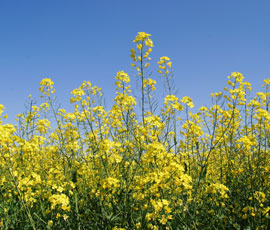Scientists sequence genetic code of OSR relative

Scientists have cracked the genetic code of a Chinese cabbage variety of Brassica rapa, a close relative of oilseed rape, which could allow breeders to develop crops with better drought tolerance.
By sequencing Brassica rapa, researchers were able to access half of oilseed rape’s genes without having to wrestle with its large and complicated genome.
Ian Bancroft, who led the research at the John Innes Centre, Norwich, said: “Oilseed rape is the second most important oil crop in the world and the most important in Europe.
“Sequencing its genes will provide breeders with the tools to improve the efficiency of developing new varieties, but this is difficult because it has a really complicated genome.”
“Thankfully, because it is a hybrid, nature has already divided up the oilseed rape genome into two more manageable chunks, one of which we have now sequenced,” Prof Bancroft added.
The breakthorough could allow breeders to develop innovative traits for rape crops, including varieties offering better yields, disease resistance and drought and temperature tolerance.
Brassica rapa and oilseed rape are both brassicas, a group which also includes broccoli, turnip, sprouts and cabbages.
Together, this important group of plants accounts for more than 10% of the world’s vegetable and vegetable oil production.
Despite their diversity, they are all closely related. This enables scientists to apply the insights they gain by sequencing one species, such as Brassica rapa, to improve the breeding efficiency of a range of crops essential to ensure global food security.
“Few people would confuse a turnip with a cauliflower, and yet, despite coming in a range of shapes and sizes, brassicas are all very closely related,” said Prof Bancroft.
“This means that many of the 41,000 genes which we have found in Brassica rapa will also be found in other brassicas.
“The insights we gain from having this sequence could be useful for improving everything from plants grown to produce chainsaw oils to the sprouts on your Christmas dinner.”
Douglas Kell, chief executive of the Biotechnology and Biological Sciences Research Council, said helping breeders to produce new varieties of staple crops, such as wheat, potatoes and oilseed rape, was essential to ensure future food security.

